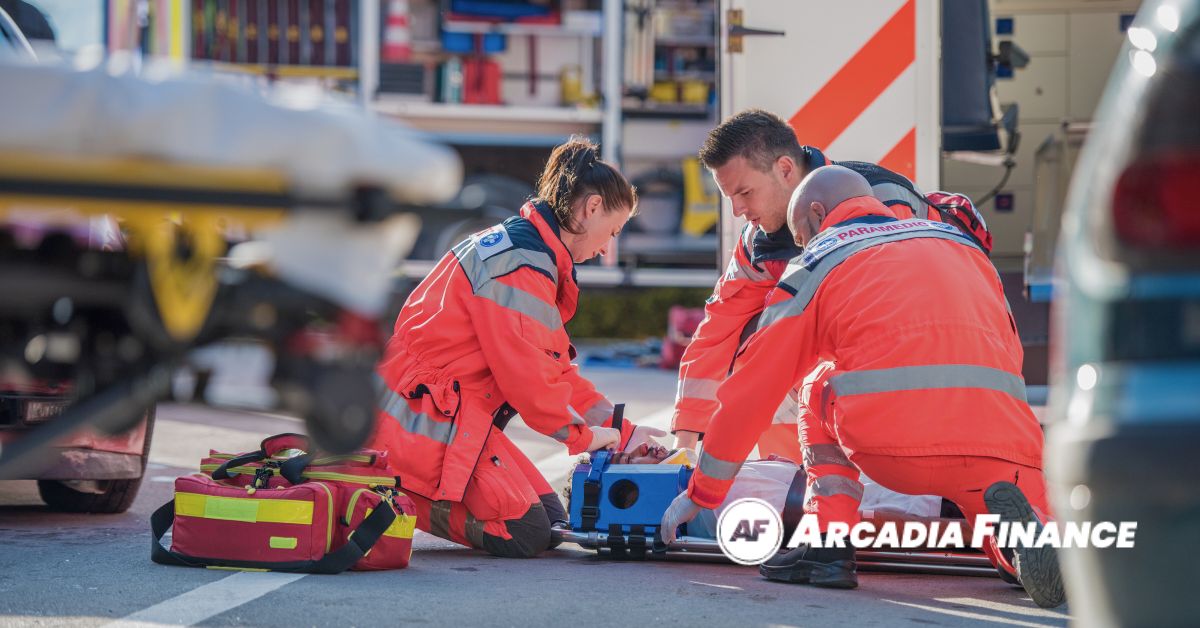
Are you considering a career as a paramedic in South Africa? It’s an essential role in the healthcare system and requires a high level of skill and training. However, one key factor that you might be interested in is the salary you can expect to earn as a paramedic. In this article, we will look at the different levels of qualifications, factors that affect salaries, and how they compare to other healthcare professions in South Africa.
Understanding the Paramedic Profession in South Africa
Paramedics are healthcare professionals that are responsible for providing medical attention to patients in emergency situations. They are often the first line of medical assistance, arriving at accident scenes, emergency medical situations, and transporting patients to health facilities. The role of a paramedic is critical in saving lives and ensuring that patients receive the necessary medical care they require.
Paramedics work in a variety of settings, including hospitals, ambulance services, and emergency response teams. They are trained to handle a wide range of medical emergencies, from minor injuries to life-threatening situations. They are equipped with the necessary skills and knowledge to provide immediate medical care to patients, stabilize their condition, and transport them to the nearest medical facility for further treatment.
Roles and Responsibilities of a Paramedic
A paramedic’s role is complex and requires them to work in highly pressurized environments. They are responsible for assessing a patient’s condition, providing emergency medical care on site before transporting them to a medical facility. This means that they need to have a clear understanding of medical procedures and emergency protocols, be competent in providing basic and advanced life support, and be able to manage high-level medical equipment.
Paramedics must also be able to communicate effectively with patients and their families, providing them with the necessary information and support during a medical emergency. They must be able to work well under pressure, make quick decisions, and remain calm in stressful situations.
Different Levels of Paramedic Qualifications
There are different levels of paramedic qualifications in South Africa. The Basic Ambulance Assistant (BAA) is the lowest level of qualification and is a one-year course. It allows you to work in the public and private ambulance services. Intermediate Life Support (ILS) is a two-year course that provides more advanced skills such as intubation, drug administration, and wound care. Lastly, the Advanced Life Support (ALS) is a three-year course that provides the highest level of paramedic training.
Paramedics with higher qualifications are able to provide more advanced medical care and are often involved in more complex medical emergencies. They may also be responsible for training and supervising other paramedics and healthcare professionals.
In conclusion, paramedics play a vital role in the healthcare system in South Africa. They are highly skilled professionals who are trained to provide immediate medical care to patients in emergency situations. With their expertise, they are able to save lives, stabilize patients, and transport them to the nearest medical facility for further treatment. The different levels of paramedic qualifications provide a clear path for career progression, allowing paramedics to develop their skills and knowledge over time.
Factors Affecting Paramedic Salaries in South Africa
The salary of a paramedic in South Africa depends on several factors. Below are the most significant factors.
Level of Education and Training
As with most healthcare professions, the higher the level of education and training, the higher the salary. Paramedics with higher qualifications typically earn a higher salary than those who are less qualified. For example, an ALS paramedic is likely to earn more than a BAA paramedic.
It’s important to note that continuing education is also a factor in determining a paramedic’s salary. Paramedics who pursue additional certifications or specializations may see an increase in their salary as a result of their advanced training.
Years of Experience
The number of years of experience also plays a role in determining a paramedic’s salary. Paramedics with more experience tend to earn higher salaries than those who are just starting their careers.
However, it’s important to note that experience alone may not be enough to guarantee a higher salary. Paramedics who have a track record of exceptional performance and leadership may be more likely to receive promotions and higher salaries than those who simply have years of experience.
Location and Cost of Living
The location of the paramedic’s place of work also affects their salary. Salaries in urban areas with high living costs like Johannesburg and Cape Town tend to be higher than those in rural areas.
Additionally, the cost of living in a particular area can also impact a paramedic’s salary. For example, a paramedic working in a rural area with a lower cost of living may have a lower salary than a paramedic working in an urban area with a higher cost of living, even if they have similar levels of education and experience.
Public vs. Private Sector Employment
The employment sector also plays a role in a paramedic’s salary. Paramedics working in the public sector, like state-run ambulance services, typically receive lower salaries than those in the private sector.
However, there are some benefits to working in the public sector, such as job security and access to benefits like healthcare and retirement plans. Additionally, some paramedics may find that working in the public sector allows them to make a greater impact on their communities.
Overall, there are several factors that can impact a paramedic’s salary in South Africa. By considering factors like education, experience, location, and employment sector, paramedics can make informed decisions about their careers and work towards achieving their financial goals.
» Read more: Revealing the Truth Behind Nursing Assistant Salaries
Average Paramedic Salaries by Qualification Level
Paramedics play a vital role in the healthcare industry, providing emergency medical assistance to individuals in need. The profession requires extensive training, education and experience, and paramedics are often faced with challenging and high-pressure situations. While the job can be demanding, it can also be highly rewarding, both personally and financially.
Here are the average salaries for paramedics in South Africa by qualification level:
Basic Ambulance Assistant (BAA) Salaries
The Basic Ambulance Assistant (BAA) qualification is the entry-level qualification for paramedics in South Africa. BAAs are responsible for providing basic medical assistance to patients, including administering CPR, bandaging wounds, and stabilizing patients for transport to a medical facility.
The average salary for a BAA paramedic in South Africa is R 8,000 monthly. While this may seem like a modest salary, it is important to note that BAAs are often employed by private ambulance services, which may offer additional benefits such as medical aid and pension contributions.
Intermediate Life Support (ILS) Salaries
Intermediate Life Support (ILS) paramedics have completed additional training beyond the BAA qualification, and are able to provide a higher level of medical care to patients. ILS paramedics are trained to administer medication, perform advanced airway management, and provide advanced life support interventions.
The average salary for an ILS paramedic in South Africa is R 18,000 monthly. This salary reflects the additional training and skills required for the ILS qualification, and the increased responsibilities that come with the role.
Advanced Life Support (ALS) Salaries
Advanced Life Support (ALS) paramedics are the highest level of paramedic in South Africa. ALS paramedics have completed extensive training and education, and are able to provide the highest level of medical care to patients. ALS paramedics are trained to provide advanced cardiac life support, advanced airway management, and advanced medication administration.
The average salary for an ALS paramedic in South Africa is R 28,000 monthly. This reflects the extensive training and education required for the ALS qualification, as well as the high level of responsibility and pressure that comes with the role.
It is important to note that paramedic salaries may vary depending on a number of factors, including years of experience, location, and employer. However, the salaries listed above provide a general idea of the earning potential for paramedics in South Africa at each qualification level.
» Learn more: Boost your knowledge on Chiropractor Salaries!
About Arcadia Finance
Make loan acquisition easier and more efficient with Arcadia Finance. Our service enables you to complete a complimentary application and receive loan offers from up to 10 lenders. Trust in the reliability and regulatory compliance of all our lending partners recognized by the National Credit Regulator of South Africa.
Comparing Paramedic Salaries to Other Healthcare Professions
Paramedics are an essential part of the healthcare system, providing emergency medical care and transportation to those in need. However, how do their salaries compare to other healthcare professions in South Africa?
Paramedic vs. Nurse Salaries
While paramedics play a crucial role in emergency medical care, nurses earn more in South Africa. According to recent statistics, the average salary for nurses is between R 17,000 and R 35,000 monthly. However, this can vary depending on their level of education and experience.
Nursing is a highly respected profession, with a range of specializations and career paths available. For example, registered nurses can work in hospitals, clinics, or private practices, while specialized nurses can work in areas such as pediatrics, oncology, or mental health. Additionally, nurses can further their education and become nurse practitioners or nurse educators, earning even higher salaries.
Paramedic vs. Doctor Salaries
Doctors earn significantly more than paramedics in South Africa. According to recent data, the average salary for a doctor is between R 48,000 and R 68,000 monthly. However, this can vary depending on their level of experience and specialization.
Becoming a doctor requires years of education and training, and they play a vital role in diagnosing and treating illnesses and injuries. They can work in a range of settings, including hospitals, clinics, and private practices. Additionally, doctors can specialize in areas such as cardiology, neurology, or pediatrics, earning even higher salaries.
Paramedic vs. Emergency Medical Technician Salaries
Emergency Medical Technicians (EMTs) earn less than paramedics in South Africa, with an average salary of R 10,000 monthly. EMTs usually provide basic life support and assist paramedics on ambulance crews.
EMTs play a crucial role in emergency medical care, working alongside paramedics to provide life-saving treatments and transport patients to hospitals. However, they require less education and training than paramedics, which is reflected in their lower salaries.
Overall, while paramedics may not earn as much as some other healthcare professions, they play a vital role in emergency medical care and are highly respected for their skills and expertise.
Conclusion
In conclusion, paramedic salaries in South Africa vary based on their level of education and experience, location of work, and employment sector. Paramedics receive lower salaries than nurses and doctors, but they play a critical role in the emergency medical services and are an essential part of the healthcare system.
Cheap loan - fast, uncomplicated, trustworthy
At Arcadia Finance you can compare loan offers from several lenders without obligation - free of charge and without any Schufa check. This gives you an overview of your options and allows you to choose the best offer.
Fill out our form now and compare interest rates at over 20 banks - transparently and quickly.

